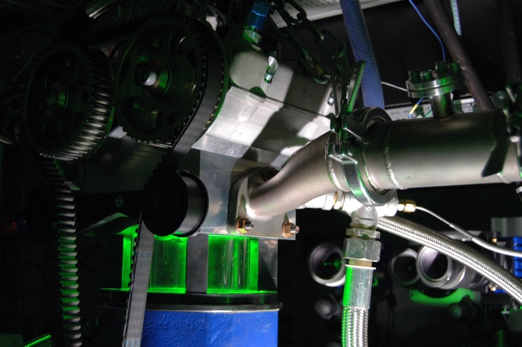Abstr:Internal combustion engine flows for motored operation: Difference between revisions
No edit summary |
|||
| Line 20: | Line 20: | ||
<br/> | <br/> | ||
---- | ---- | ||
{{ACContribs | |||
|authors=Carl Philip Ding,Rene Honza, Elias Baum, Andreas Dreizler | |||
|organisation=Fachgebiet Reaktive Strömungen und Messtechnik (RSM),Technische Universität Darmstadt | |||
}} | |||
{{ACContribs | {{ACContribs | ||
|authors=Carl Philip Ding,Rene Honza, Elias Baum, Andreas Dreizler | |authors=Carl Philip Ding,Rene Honza, Elias Baum, Andreas Dreizler | ||
Revision as of 12:28, 9 October 2018
Internal combustion engine flows for motored operation
Application Area 2: Combustion
Application Challenge AC2-10
Abstract
This test case provides data on the in-cylinder flow for an IC engine under motored operation. The Technische Universität Darmstadt engine features a typically design of a modern spark-ignition direct injection engine. It is an optically accessible single cylinder engine especially designed to provide well characterized boundary conditions and reproducible engine operation; a prerequisite for any comparison of experiments and simulations. The in-cylinder flow is characterized by various particle image velocimetry (PIV) techniques to provide measurements at high spatial and temporal resolutions. The database for validation includes the first two statistical moments (mean and rms) of velocities, spatial flow structures and the temporal evolution of the flow field over the entire engine cycle in the central tumble plane. Information on the 3D flow is available within a volume up to 8 mm thick centered on the central tumble plane. Important boundary conditions as the in-cylinder, intake- and exhaust-port pressures as well as temperatures are given. Simulation results obtained from three investigations using LES (Large Eddy Simulation) and hybrid URANS (unsteady Reynolds-averaged Navier-Stokes)/LES are presented and compared with the experimental results.

|
| Figure 1: Photograph of the optically accessible engine. The in-cylinder volume is illuminated by the green laser-sheet used for the flow field measurements using particle image velocimetry (PIV). |
Contributed by: Carl Philip Ding,Rene Honza, Elias Baum, Andreas Dreizler — Fachgebiet Reaktive Strömungen und Messtechnik (RSM),Technische Universität Darmstadt
Contributed by: Carl Philip Ding,Rene Honza, Elias Baum, Andreas Dreizler — Fachgebiet Reaktive Strömungen und Messtechnik (RSM),Technische Universität Darmstadt
© copyright ERCOFTAC 2018
